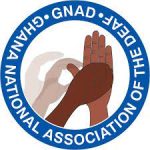By D.I. Laary
Accra, Sept. 27, GNA – The Ghana National Association of the Deaf (GNAD) is urging for the official recognition of Ghanaian Sign Language (GSL) and adoption of positive discrimination to improve employment accessibility to deaf people.

The call for this affirmative action aims to address the pressing issue of unemployment among Ghana’s deaf population and ensure that deaf individuals are empowered to contribute their unique skills and talents to the country’s workforce, by creating policies that favour the deaf.
Mr Matthew Kubachua, National President of GNAD, stated this in a statement copied to the Ghana News Agency to commemorate this year’s International Week of the Deaf (IWD) and International Day of Sign Languages (IDSL), both of which are marked in September each year.
This year’s IWD is themed, “A World Where Deaf People Everywhere Can Sign Anywhere!”
Mr Kubachua said the theme aligns with one of the association’s topmost priorities, “a call for improved access to employment opportunities through recognition of Ghanaian Sign Language.”
He said a considerable number of Ghana’s 470,737 people, officially recognised as having various degrees of hearing loss, were still unable to access job opportunities and get stable or decent employment.
Mr Kubachua said this was a notable departure from interventions like road toll jobs for PWDs, youth employment projects, planting for food and jobs, and others, and therefore called for a new approach to integrating young Ghanaians, who are deaf and hard of hearing, into the labour market.
In a rapidly changing society marked by a weakened welfare support system, and an alarming level of youth unemployment, experts emphasized the importance of secure and equal employment as a crucial factor for individuals striving for independent living.
Mr Juventus Duorinaah, Executive Director of GNAD, said access to decent employment would contribute to securing and strengthening social security and pension entitlements, which lead to security in old age, good health, and adequate nutrition.
“For Persons with Disabilities (PWDs), work not only creates the opportunity to earn income but also enables PWDs to participate fully in mainstreaming society,” he added.
He said deaf people faced multiple challenges, such as low educational attainment and limited employable skills in the labour market, which put them at a significant disadvantage.
Deep-rooted societal beliefs about deafness, combined with widespread ignorance regarding the capabilities of deaf individuals, have further aggravated concerns about their suitability in workplaces.
“This prevailing doubt about their potential as valuable employees further exacerbates the already dire situation of youth unemployment among the deaf community in Ghana,” he said.
Even though Ghana joins the international community to observe IDSL, Mr Duorinaah said unemployment among deaf youth would continue to remain high unless the government adopted positive discrimination initiatives to promote their full integration into the labour market.
He called on the Ministries of Gender, Children, and Social Protection, Employment, and Labour Relations, to expedite action towards the adoption of Ghana’s Equity Employment Policy.
He said the government had failed to utilise the provisions outlined in Section 10(1) of the PWDs Act, Act 715, 2006, which mandated tax incentives for groups and businesses employing persons with disabilities (PWDs).
He urged the government to expedite action in the re-enactment of the revised PWDs Act, Act 715, to provide a legal and regulatory framework to motivate employers to employ PWDs.
“We call on the Ministry of Business Development to provide support to young entrepreneurs who are deaf and hard of hearing,” he stated, in keeping with the SDG objective that they are not left behind.
Mr Duorinaah urged the Ministry of Education to include agricultural and electrical engineering in the current senior high school curricula for the deaf to better prepare them for self-employment.
GNA